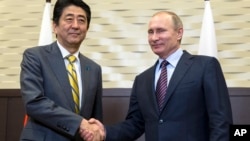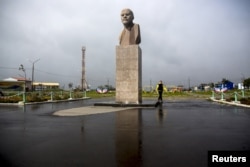Japanese Prime Minister Shinzo Abe was in Russia Friday hoping to ease strained relations between Tokyo and Moscow before President Vladmir Putin heads to China for a bilateral summit next month.
At the top of the agenda was a long-running dispute over the group of islands Russia calls the southern Kurils and Japan calls the Northern Territories. But Moscow and Tokyo were both quick to dismiss any suggestions that Friday’s meeting would lead to a quick fix to their long-standing territorial dispute.
The governments in Tokyo and Moscow have yet to sign a peace treaty for World War II after Soviet troops seized four islands. While Japan has demanded the return of the islands, Russia has offered to give back only two of them.
Russia announced plans in March to station coastal missile systems on the disputed islands, sparking a rebuke from Japan.
Easing strained relations
In 2013, Abe was the first Japanese leader to make an official visit to Russia in a decade. But, relations grew strained shortly after he visited the 2014 Winter Olympics in Sochi, when Japan joined the United States and the European Union in penalizing Russia for annexing Ukraine’s Crimean peninsula and supporting separatists in its former Soviet neighbor’s east.
Japanese news agencies in February reported that U.S. President Barack Obama asked Abe to cancel his scheduled trip to Russia but the Japanese prime minister refused.
The fact that Japan is seeking to maintain relations with Russia, despite U.S. pressure, will allow the two sides to tackle "all the different problems," Putin said last month.
The Kremlin said Thursday that the Russian president would propose new cooperation in trade, finance and the economy at the meeting. The dispute over the islands will be raised, though it’s a "difficult" issue that requires a much closer partnership, presidential foreign policy aide Yuri Ushakov told reporters Thursday. Abe's visit will give a “new impetus” to ties, he said.
Abe was on a tour of Europe this week, visiting Italy, France, Germany and the United Kingdom; he’s scheduled to chair the Group of Seven industrialized countries’ meeting in Japan’s Ise-Shima region in late May.
Russia was pushed out of the group of the world’s largest economies, then called the G-8, after a rift with Canada, France, Germany, Italy, Japan, Britain and the United States over Moscow's alleged role in the Ukraine conflict.
This week, Abe and French President Francois Hollande have agreed to continue dialogue with Russia ahead of the upcoming G-7 meeting, according to Japanese news reports.
Political analysts say Abe is positioned to facilitate dialogue between the G-7 and Russia.
"The meeting will allow him to more effectively play the role of a ‘bridge’ or mediator between Russia and the G-7, which will let him gain more political points," said Valery Kistanov, who heads the Center for Japanese Studies at the Russian Academy of Sciences, in comments emailed to VOA.
Russia’s China pivot
Perhaps the biggest worry the Japanese prime minister has now is Russia’s pivot to China.
Behind Abe’s eagerness to meet Putin is to ease what he sees as a geopolitical threat to Japan from China as an isolated Russia draws closer to Beijing.
"Japan is very concerned about the rapprochement of Russia and China, believing that this may occur on the grounds of anti-Japanese base," said Kistanov. "In particular, Tokyo is disturbed by the possibility of creating a single territorial front of Moscow and Beijing against Tokyo, since Japan has a much more acute territorial conflict with China over the Senkaku Islands [Diaoyu in Chinese] in the East China Sea than that with Russia."
Russia-China military drills have also raised eyebrows in Tokyo.
"As the so-called theory of ‘China threat’ is much spread in Japan," said Kistanov, "the Japanese are very concerned about the increasing military cooperation between Moscow and Beijing."
Trade declining
At the end of 2015, bilateral trade between Japan and Russia was down 30 percent from the previous year, while Russian exporters dropped 27 percent and Japanese imports fell 38 percent, according to Russia’s Presidential Press Service.
The press service blamed the fall in commodity prices and weakened exchange rates, as well as on Tokyo joining western sanctions against Russia. It said the Russian and Japanese leaders would discuss ways to strengthen trade and economic relations.
"As for economic cooperation, the most important obstacle to Russia's turning into an important trade partner of Japan is not a territorial problem and not the lack of a peace treaty, but the structural weaknesses of the Russian economy," Kistanov said.
Tokyo-based journalist Maxim Krylov told VOA that Japanese media coverage of the Putin-Abe meeting in Sochi had been fairly modest so far.
"Apart from internal Japanese issues, eyes are now on Abe's trip to Europe, which lays the ground for the upcoming G-7 summit in Ise-Shima," Krylov said in emailed comments.
“By comparison, Abe's meeting with Putin is an event of a much lower profile: unofficial visit, one-on-one talks, no press conference after the meeting ends, not much in terms of details on the agenda,” he concluded.





